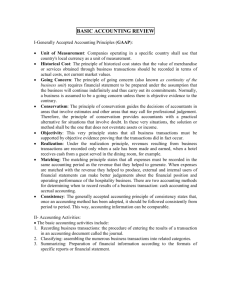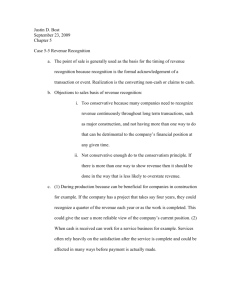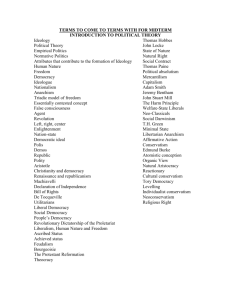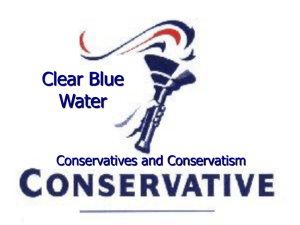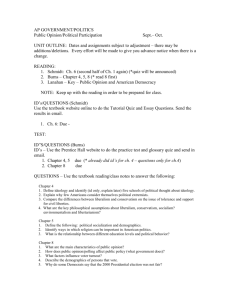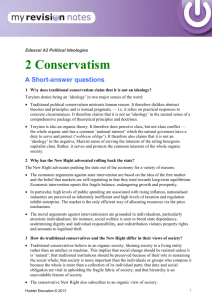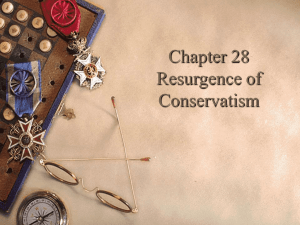Conservatism revised
advertisement
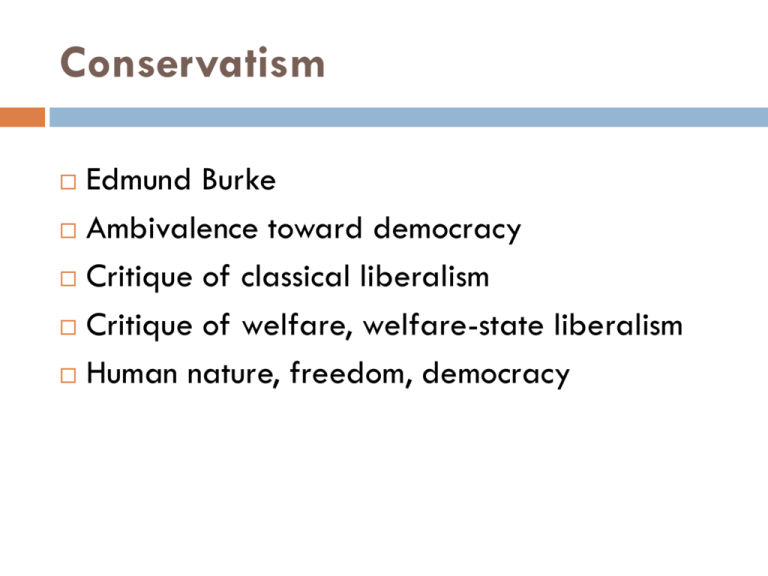
Conservatism Edmund Burke Ambivalence toward democracy Critique of classical liberalism Critique of welfare, welfare-state liberalism Human nature, freedom, democracy History Edmund Burke older conservatism, classical conservatism Newer variant, modern or contemporary conservatism Similarities Conserving something Differences What How By whom Classical conservatism Edmund Burke Spokesperson, standard-bearer, champion Liberal view of human nature and government mistaken (theory) and politically pernicious (practice) Creatures of habit, custom, and tradition Political society living and changing organism greater than sum of its individual parts “Social contract” less a legal contract than a sacred covenant Classical conservatism, II Freedom Not necessarily a good thing; analogous to fire Depends on uses to which it is put Kept under control and put to good use, freedom is valuable Out of control, destructive power of people freed from legal and traditional restraints is horrible No abstract “right” to liberty Rights -- including one’s right to liberty -- always concrete, never abstract or universal Liberties -- particular freedoms people enjoy in particular societies Classical conservatism, III Democracy Ripe with possibility of abuse Too much power to least reflective, responsible Society best governed by those with greatest stake in its well-being, most reflective, thoughtful Elected representative not a delegate, but a trustee Not a mirror nor messenger Represent interests as s/he sees fit Reflections on the Revolution in France (1790) Envy and rage, abstract liberal theories about “liberty” and “the rights of man,” mobs of masterless men and women embarked on mad rampage Ordered liberty = to act in accordance with laws and abide by traditions of one’s own society Laws and traditions enablements -- aids to help people play useful part in larger, well-ordered whole Society = web of relationships and reciprocal dependencies Members of community or nation woven together like threads in larger social fabric Society of self-seeking individuals, each independent of others and “free” to pursue his/her self-interest is deranged, disordered, or sick Triadic notion of freedom Society = people involved in relationships of mutuality and interdependence Each person has his or her particular station or status and stake in larger society Goal of free men and women is to maintain integrity of social fabric Politics of imperfection Purpose of political activity = preserve and conserve social fabric within which human activities are carried on from day to day, from one generation to next Politics = attending to arrangements of one’s society Not to radically remake one’s society, to make imperfect persons and institutions perfect “Politics of imperfection” Repudiation of “rationalist” politics of perfection “Muddling through” Radicals and rationalists believe human nature is malleable and perfectible Society is not perfect, can never be made so Politics = not an exact science but an inexact and imperfect art -- the art of “muddling through” one step at a time and without aid of abstract theories or rationalist blueprints One of the few simple truths is that there are no simple truths -- no easy solutions to social problems -- because social problems are always complex Modern conservatism or neoclassical liberalism (neoliberalism) Speaks language of liberalism and individualism Burke found objectionable Seeks to conserve not Burke’s “social fabric” but principles of individualism, competition, and self-interest Freedom tied to free enterprise, competitive, capitalist economic system; especially strong in U.S. Problems are simple – stemming from too much government “interference” in operations of free market Solutions are simple – reduce size of government; reduce government spending, particularly social welfare programs; and give free market free reign Same as earlier, economically minded liberals (e.g., Manchester Liberals) Neoconservatives Disenchanted welfare-state liberals Concerned with disruption and dislocations of freewheeling market economy Welfare state has fared badly “Cultural contradictions” undermines capitalism’s already-thin moral and intellectual foundations Interest in artistic, literary, educational, and other cultural issues Religious Right Religion cornerstone of viable conservative society Classical conservatism profoundly skeptical; Religious Right not Antipathy to communism Threat to traditions and way of life are economic, political, cultural and moral Morality = Christian fundamentalism Claims to be democratic; society ruled by righteous or “moral” majority of “born-again” Christians Government intervention in areas and activities previously deemed private (e.g., abortions, prayer) Conservatism as ideology Explanation (why social conditions are as they are) human imperfection Evaluation (how we should judge the way things are) by social peace and stability Orientation (our position, place, identity) part of greater whole; must act with good of whole in mind; play our part in society Program (what to do) proceed slowly and carefully; better to do a little good than a lot of harm Conservatism and democracy Modest view of what is possible Given weakness of human reason and strong tendency toward selfishness, pure democracy will degenerate into anarchy dictatorship or despotism Democracy acceptable only when people have limited power and make limited demands People must exercise self-restraint and elect members of natural aristocracy/conservatives to represent them and secure fragile social fabric Key terms Classical conservatives politics of imperfection original sin Edmund Burke organic view of society conservative (Burkean) notion of freedom conservative reform prejudice (prejudgement) representative government vs. direct democracy true natural aristocracy little platoons (civil society) Reactionaries cultural conservatism Tory democracy individualistic/modern conservatism mass society Leveling conservatives and communism Neoconservatism religious right conservatives Discussion questions 1. 2. 3. 4. 5. 6. What is the classical conservative conception of human nature, freedom, and democracy? How does classical conservatism function as an ideology? Conservatism is sometimes called the “philosophy” or “politics of imperfection.” Is this an accurate description of conservatism? Be sure to refer to specific conservative thinkers and themes to support your position. In the U.S., conservatives are usually taken to be people who want less government. Is this an adequate understanding of conservatism in general? Why or why not? Some people say that conservatives are so divided amongst themselves that it makes no sense to think of conservatism as a single ideology. Are they right? Why or why not? What are the major forms of conservatism in the United States today? Which of them do you find most and which least satisfactory? Refer to specific policies and positions as you explain your choices.
